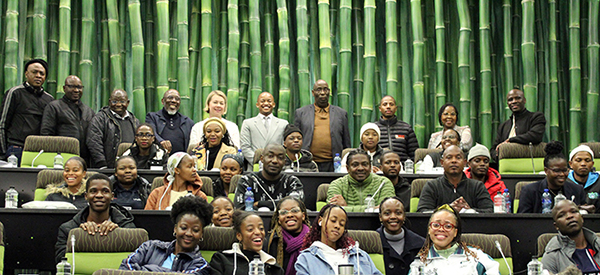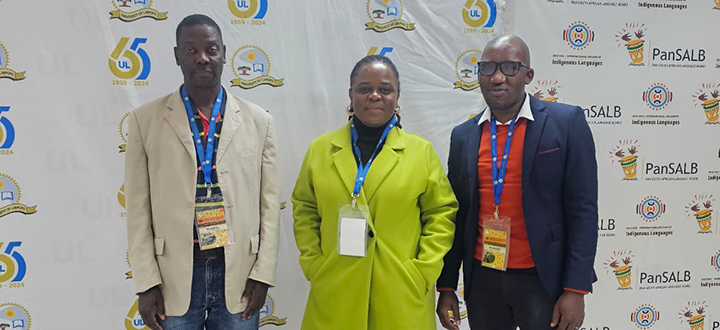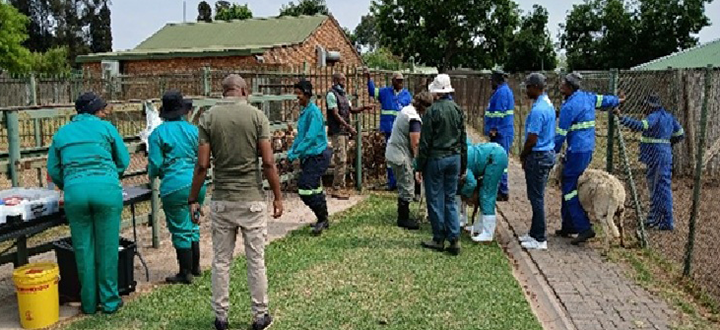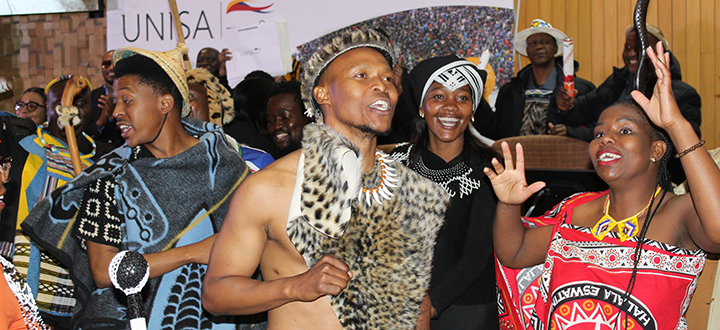News & Media
Unisa dialogue examines the enhancement of African agency via BRICS
On 9 March 2025, Unisa’s Department of Internationalisation and Partnerships and the Russian State University for the Humanities hosted a student engagement dialogue themed Enhancing African Agency via BRICS: Does African Presence in the Alliance Increase Multipolarity?”.
This dialogue featured keynote speaker Dr Daria Zelenova, Associate Professor of the Russian State University for the Humanities and Head of the Research Centre for African Strategy in BRICS at the Institute for African Studies of the Russian Academy of Sciences.
Africa's growing role in BRICS

Dr Daria Zelenova, Associate Professor of the Russian State University for the Humanities and Head of the Research Centre for African Strategy in BRICS at the Institute for African Studies of the Russian Academy of Sciences
In her address, Zelenova said that in 2024, Ethiopia and Egypt joined BRICS, expanding its African dimension. This, she said, reflects Africa’s rising global influence, BRICS’s commitment to South-South cooperation, and the shift towards a polycentric world. Zelenova stated that with the African Union joining the G20 in 2023, discussions on Africa’s United Nation’s Security Council representation are gaining momentum.
Enhancing African strategy
Continuing, she said that since the inclusion of South Africa in BRICS in 2010, the country has progressively integrated its continental interests into the activities of the association, strengthening Africa’s voice in the international arena and building an important foreign policy vector of South-South relations.
She also commended the formation of the African Continental Free Trade Area (AfCFTA), stating: "This monumental achievement is a game-changer for Africa's economic destiny, positioned to unlock massive opportunities for trade, industrialisation, and success across the continent, while unifying Africa on the global stage as a united economic powerhouse."
Zelenova said that the key tool for expanding the dialogue was the practice of outreach, which included inviting neighbouring states that are not members of BRICS member states to participate. She explained: "At the Durban Summit in 2013, for the first time, the South African government invited both the African Union and of the NEPAD Heads of State Committee to participate in the summit meetings. This marked the beginning of a regular dialogue between representatives of the AU and BRICS."
"South Africa," she continued, "promoted the outreach format with representatives of the regional economic communities (RECs) of Africa, and in 2013, for the first time, the leaders of the African continent, who led Africa’s RECs from Gabon, Uganda, Ethiopia, Togo, Zambia, Namibia and Angola, were invited to the Durban Summit."
Zelenova emphasised that through purposeful engagements, South Africa continued to significantly expand the BRICS African agenda through putting forward proposals to strengthen the role of youth and women in the economy and the trade integration of AfCFTA. Also significant is the tabling of global issues such as climate change, and food and energy security, which later became South Africa’s priorities in BRICS.
Zelenova noted that topics on Africa’s development activities are becoming socially oriented, which draws them close to the
vision proposed by the African Union in its Agenda 2063
New BRICS entrants – a voice for the Global South?
In 2024, the BRICS bloc saw an expansion in its membership to two additional African states, Egypt and Ethiopia. Previously, South Africa was the only African representative in the BRICS group.
Zelenova argued that a comparison of Ethiopia and Egypt’s strategic interests demonstrates that the two states frame their participation in BRICS differently: "Ethiopia," she said, "is a country that wants economic diversification and seeks delinking from Western institutions in order to foster South-South cooperation, whereas Egypt is joining BRICS more for political reasons, while remaining a key Western partner in many areas of cooperation." She cautioned that this poses a wider question of the core and global role of BRICS as an alliance that promotes certain values and certain economic projects.

Unisa students, together with the university’s distinguished academics, after a riveting dialogue with Dr Daria Zelenova
Several African countries have expressed a keen interest in joining BRICS. These include Nigeria, Uganda and Algeria. This, she said, demonstrates the attractiveness of BRICS and its commitment to continued growth and economic expansions.
Concluding, Zelenova stated that South Africa’s trajectory in BRICS has illustrated how a state previously isolated during apartheid integrated into global structures, reshaped its international agenda, and continues to inspire other African countries to join the bloc as emerging global economic powerhouses that promote South-to-South relations.
After Zelenova’s address, the engagement entered into a question-and-answer session, during which students deliberated on salient points and questions around the expansion of BRICS, the G20’s influence, and the polarities between the West and the South, among other topics.
* By Godfrey Madibane, Acting Journalist, Department of Institutional Advancement
Publish date: 2025-06-11 00:00:00.0


 Unisa makes significant impact at ALASA 2025 Conference
Unisa makes significant impact at ALASA 2025 Conference
 Work-integrated learning practice – extending beyond traditional distance education
Work-integrated learning practice – extending beyond traditional distance education
 Computer scientist and ICT specialist to share 4IR insights at Unisa's CNA Research Symposium
Computer scientist and ICT specialist to share 4IR insights at Unisa's CNA Research Symposium
 Unisa champions inclusivity with landmark language policy
Unisa champions inclusivity with landmark language policy
 Unisa empowers Daveyton community through recycling workshop
Unisa empowers Daveyton community through recycling workshop